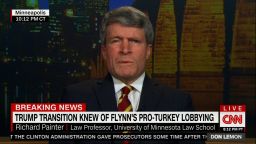Editor’s Note: Richard W. Painter is the S. Walter Richey professor of corporate law at the University of Minnesota. He was the chief White House ethics lawyer for President George W. Bush from February 2005 to July 2007. Painter is the author of several books on government ethics as well as the ethics of bankers and lawyers. The views expressed are his own.
Story highlights
Richard W. Painter: Russia investigation more serious than Watergate scandal in 1970s
Russian attempt to subvert political system would have been seen as crisis then, he says
Here’s a hypothetical question: What would have happened if the Watergate break-in had been carried out by the KGB?

It seems silly to ask, considering that the 1972 burglary – an effort to plant listening devices in the Democratic National Committee headquarters to glean damaging information the Nixon campaign could use was an amateur job committed by anti-communist guys who in the Cold War era of the time were on “our side.” And nobody had to worry about Richard Nixon being too close to a US adversary; he had made his political career by overstating the communist threat. If his statement, “I am not a crook,” was not entirely true, at least he was our crook.
But it isn’t a silly question at all. Imagine how the Watergate scandal would have unfolded, and the firestorm that would have erupted, if the Watergate job had been done by the KGB. Instead of sending bungling burglars into the Watergate complex, a much more professional job could have been done by someone like a young Vladimir Putin, who would become a rising star in the KGB a few years later.
Back then we took seriously Russian efforts to destabilize governments around the world. An attempt by the Russians to subvert our political system – through coordination not with the hapless American Communist Party but with the campaign of a major party candidate – in the 1970s at least would have been viewed as a national crisis of epic proportions.
And back then one word would have been used to describe the crime committed by anyone who coordinated with the Russians in such subversive activity: treason.
The good news of course is that this did not come to pass. Nixon was a lot of things, good and bad, but he was not a traitor.
Forty-four years later, with the Russia investigation embroiling President Donald Trump, we know that a number of high-ranking people in his campaign and administration have been close to, and have received financial benefits from, the Russians. The President’s own son only a few years ago reportedly said the Trump family makes a lot of money in Russia. Although the President now denies that is the case, we don’t know for sure, because he won’t release his tax returns and other financial records that would reveal that information.
If Watergate had been a KGB operation to subvert a Democratic Party candidate and support Nixon, Sen. Howard Baker’s famous question – “What did the president know and when did he know it?” – would have become the most pressing question of the day.
If there had been substantial evidence of the president’s high-ranking campaign officials coordinating with the KGB or other foreign intelligence operatives, Congress might even have invoked the 25th Amendment or some other procedure to take control of the nuclear arsenal from the president temporarily and perhaps the vice president. In those days, we would not have risked the Russians having any influence over our military.
And if the Russians or some other foreign adversary had been involved in the Watergate break-in, the call for an independent investigation by a special prosecutor would have been even more intense. With the odor of KGB activity in the room, any attempt by the president to interfere with the independence of the investigation would have been an impeachable offense.
The attorney general, deputy attorney general and other political appointees of the president likely would have been required to recuse themselves from investigation of the president’s political campaign. (An attorney general who, like Jeff Sessions, had lied in his confirmation hearings about his own contacts with the Russians would have been out of office in a heartbeat.)
Views on Comey's firing
And if, as is the case today, the president or anyone else high up in the administration had been suspected of having financial dealings with the Russians or any other adversary, tax returns and all other relevant documents would have been subpoenaed immediately by Congress. If these records showed no compromising payments, they would have been publicly released as soon as possible to reassure a panicked public.
Meanwhile, we still don’t know who in the Trump campaign was talking with the Russians and when. We don’t know who in the campaign knew that the Russians were engaged in criminal spying activities for the benefit of the campaign. Several people, including former national security adviser Michael Flynn and Sessions, have not told the truth about their contacts with the Russians, and Flynn secretly received money from the Russians until shortly before he took the top job at the National Security Council.
The only valid precedent for the situation we are in today would be the Watergate break-in, with the Nixon campaign’s knowledge, being carried out by the KGB.
The situation we are in now is not Watergate. It is worse and more dangerous.






